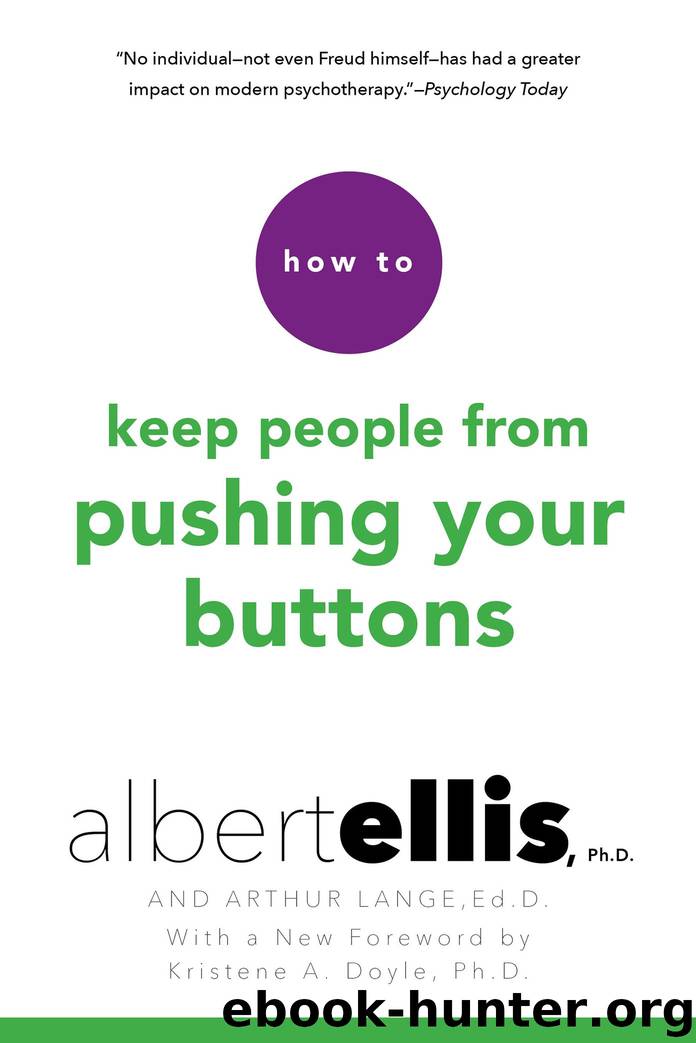How to Keep People From Pushing Your Buttons by Albert Ellis

Author:Albert Ellis
Language: eng
Format: epub
Publisher: Kensington
Published: 2016-10-26T16:00:00+00:00
The Critic
You have a good friend (or lover) who is an interesting, really alive, stimulating person. You enjoy her company, and she has many fine qualities—but she often is critical, negative, or sarcastic toward you. She frequently implies that you are not intelligent or you’re wrong, or you’ve got poor judgment, or you didn’t handle something right.
You get together at your place, which you’ve just spent thousands of dollars to redecorate. She spends much of the time making digs and expressing disbelief in your taste and judgment. She’s not flagrantly attacking, but you clearly get the message that she often disapproves not only of what you do, but also of you for doing it.
Step 1: How am I feeling and acting if I let her push my buttons?
Functionally: Displeased and frustrated about what she’s doing.
Dysfunctionally: Overly angry at her, hurt, defensive, and fed up.
Step 2: What am I irrationally thinking to make myself excessively anxious, angry, depressed, guilty, defensive or vindictive?
a: What am I irrationally thinking about myself ?
“What if I am as stupid as she thinks? Maybe she’s right and I’m just being defensive.”
b: What am I irrationally thinking about the others?
“No, it’s not me, it’s she! She shouldn’t be that critical! I just hate her when she’s so negative! She drives me crazy with that sarcastic tone. She’s just a phony! She has to put everyone down because she’s so insecure herself!”
c: What am I irrationally thinking about the situation?
“With friends like this, who needs enemies? I shouldn’t have to stand for this garbage! Being friends with her isn’t worth it. This is it! I’ve had it! This is the last time I let her put me down! She’s got to stop it; she’s driving me nuts!” (The underlying beliefs here are “It’s not fair as it should be!” and fear of rejection and failure.)
Step 3: How can I challenge and dispute my irrational thinking?
“Although she is often negative and sarcastic, is it really awful that she is? No. Do I have to please her or have her approval? No! Do I have to let her push my buttons, or can I decide how I’ll react? Can she actually drive me crazy, or do I make myself miserable when she is so critical?”
Step 4: What realistic preferences can I substitute for my irrational thinking?
“I’d like her to be more positive, and to drop her sarcasm and criticism. I do want honest opinions, but not putdowns. It’s frustrating that she’s negative so frequently. I want her to stop it, but I can certainly stand it. I can confront her about this without blowing up. If she changes, then we can continue our friendship, but if she doesn’t, I may well end it. That would be sad, but not awful. I am really committed to trying to improve this friendship before I give up [frustration intolerance] and end it too quickly.”
When someone like this pushes your buttons, you may often either rationalize it because you are afraid to confront this
Download
This site does not store any files on its server. We only index and link to content provided by other sites. Please contact the content providers to delete copyright contents if any and email us, we'll remove relevant links or contents immediately.
Happiness by Matthieu Ricard(3039)
How to Stop Worrying and Start Living by Dale Carnegie(2704)
Getting Things Done by David Allen(2689)
The Chimp Paradox by Peters Dr Steve(2370)
What I Need by J. Daniels(2075)
The Empath's Survival Guide by Judith Orloff(2056)
The Finnish Way by Katja Pantzar(1987)
The Smartest Kids in the World by Amanda Ripley(1843)
Jealousy by Osho(1747)
Everything in Its Place by Dan Charnas(1733)
The Joy of Hygge by Jonny Jackson(1721)
Free Yourself from Fears by Joseph O'Connor(1634)
Who Moved My Cheese?: An Amazing Way to Deal With Change in Your Work and in Your Life by Johnson Spencer(1628)
Don't Sweat the Small Stuff at Work by Richard Carlson(1556)
Think Happy to Stay Happy by Becca Anderson(1507)
How to Build Self-Discipline to Exercise by Martin Meadows(1506)
Coping with Anxiety by Edmund Bourne & Lorna Garano(1500)
The Secret History of Freemasonry by Paul Naudon(1483)
Expectation by Anna Hope(1458)
